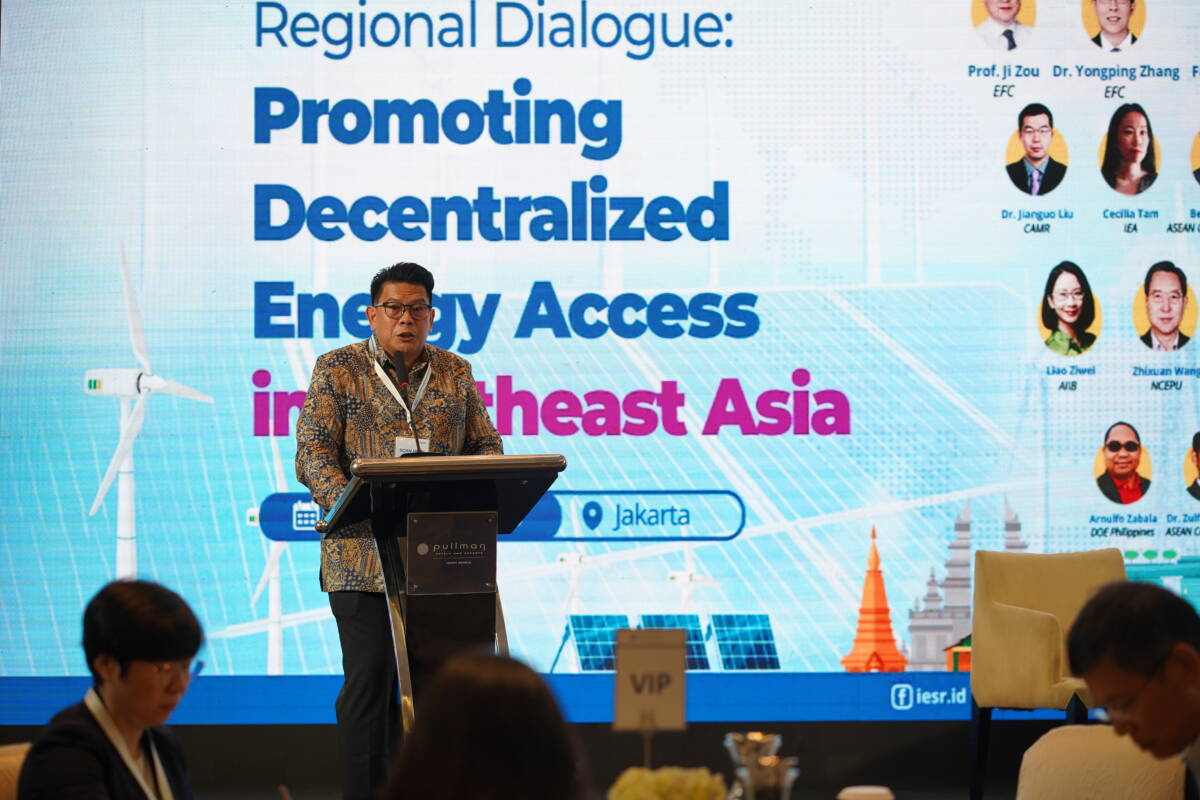Jakarta, 24 April 2025 – Although the electrification ratio in the ASEAN region has generally surpassed 90 percent, many communities still lack access to reliable and high-quality electricity to support their productivity and economic growth. To enhance energy security, affordability, and sustainability, ASEAN countries need to adopt decentralized energy systems based on locally sourced renewable energy such as solar, mini-hydro, and bioenergy.
In light of Malaysia’s ASEAN Chairmanship, the Institute for Essential Services Reform (IESR) organized the Regional Dialogue: Promoting Decentralized Energy Access in Southeast Asia from Tuesday (22/4/2025) to Wednesday (23/4/2025). The event aimed to deliver recommendations to support the inclusion of decentralized renewable energy in the ASEAN Plan of Action for Energy Cooperation (APAEC), as part of a regional effort to accelerate the energy transition.
The dialogue featured 29 resource persons who shared insights and recommendations across various aspects, including policy, financing mechanisms, capacity building, collaboration models, and oversight. Additionally, 97 participants from eight ASEAN member countries and three other nations joined the event to engage in discussions and explore opportunities for collaboration.
Fabby Tumiwa, Executive Director of IESR, emphasized that the decentralization of renewable energy is a strategic effort to address the energy trilemma and enhance community participation. He noted that the implementation of decentralized renewable energy systems in ASEAN still faces several challenges, including limited technical infrastructure, difficulties in accessing affordable financing, and a shortage of skilled human resources.
“While improving grid capabilities for renewable energy accommodation, reforming financing mechanisms that value benefits beyond kilowatt-hours, and enhancing local capacity and knowledge transfer, ASEAN must also ensure that decentralized energy systems are well integrated,” Fabby said.
Prof. Ji Zou, CEO and President of Energy Foundation China, affirmed that with its advantages in scalability, sustainability, and accessibility, decentralized renewable energy can serve as a key pillar for ASEAN’s energy future
“Decentralized energy is the catalyst for economic growth. Currently, many ASEAN countries are seeking to scale up renewable energy investments, while the market increasingly demands distributed PV systems and hybrid mini-grids. Decentralized energy has the potential to drive investment, accelerate technological innovation, and create new business models. By unlocking these opportunities, decentralized energy not only supports ASEAN’s ambitious transition goals but also lays the foundation for long-term economic prosperity and energy resilience,” said Prof. Zou.
Chrisnawan Anditya, Acting Head of the Bureau of Communication, Public Information Services, and Cooperation at the Ministry of Energy and Mineral Resources (MEMR), emphasized the importance of cross-country collaboration in advancing energy decentralization across the ASEAN region. He noted that while policies and regulations remain complex, community engagement is crucial to ensuring the long-term sustainability of renewable energy infrastructure.
IESR outlined six key recommendations to accelerate the development of decentralized energy in ASEAN.
First, underscore the integration of energy decentralization in APAEC 2026–2030 as a strategic approach to reduce reliance on centralized grid infrastructure, promote an equitable energy transition, and empower local communities.
Second, diversify financing schemes. ASEAN member states are encouraged to develop blended finance mechanisms, adopt results-based financing (RBF), increase access to green bonds and climate finance, and strengthen public-private partnerships (PPPs).
Third, implement inclusive and participatory models that are community-centered by institutionalizing the roles of local governments and communities, and developing cross-country implementation guidelines.
Fourth, strengthen the policy and regulatory framework by harmonizing decentralized energy regulations, setting long-term national targets and roadmaps, integrating decentralized systems with national grids, and providing incentives and risk mitigation measures.
Fifth, enhance capacity building and knowledge transfer. This includes launching regional training and certification programs, establishing decentralized energy knowledge centers, and supporting cross-country research and innovation.
Sixth, strengthen collaboration and ensure continuous monitoring by establishing an institutionalized regional dialogue platform and monitoring framework. Regular evaluations should also be conducted to ensure accountability and track measurable progress.

